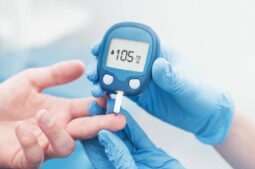
Bloating during ovulation is common in the menstrual cycle. Many women are affected by this annoying sensation, which is caused by hormonal changes. However, this is not a problem that should dictate daily life and routine.
Today, we will talk about this bloating: symptoms, causes and how to differentiate it from premenstrual syndrome. We will also provide some guidelines for coping with the resulting discomfort.
Symptoms of bloating during ovulation
Bloating, also known as abdominal swelling, is an uncomfortable sensation of abdominal pressure. It can be painful and sometimes accompanied by gases, which cause the stomach to expand.
Bloating and fluid retention are often confused, but they do not present the same discomfort and show different symptoms. Abdominal bloating is an increase in localized pressure in one specific area, while fluid retention affects the stomach and other areas of the body, such as the limbs or legs, causing a sensation of heaviness and even inflammation, but this does not go along with gases or increased pressure.
As for the causes of bloating, they are quite diverse. In some cases, it may be triggered by certain foods, while in others, hormones are the responsible factor. Bloating during ovulation clearly has a hormonal component.
Why does ovulation cause bloating?
During ovulation, the body undergoes variations and hormonal changes. Specifically, the levels of LH (luteinizing hormone) and estrogen increase just before ovulation begins. This can lead to an increase in abdominal pressure, causing a sensation of swelling. The duration of swelling during ovulation is usually not very long. Generally, the sensation disappears within a few days. However, certain conditions such as Polycystic Ovary Syndrome (PCOS), endometriosis, or ovarian cysts can prolong the swelling a bit more.
Therefore, since bloating is due to hormonal alterations inherent to the menstrual cycle, feeling swollen during the ovulation phase is completely normal.
Differences between ovulation bloating and premenstrual bloating
The most evident difference is the timing of the cycle in which both types of swelling occur. Discomfort due to premenstrual syndrome (PMS) appears one week before the period, while ovulation and its symptoms manifest in the middle of the cycle. They generally start a couple of days before the actual ovulation. Therefore, tracking the menstrual cycle should be sufficient to differentiate them.
Furthermore, there are additional symptoms that occur during PMS. It can bring about mood swings, irritability, headaches, nausea, constipation, or diarrhea. Other signs of this phase include abdominal cramps, fatigue, and swollen and tender breasts.
How to manage bloating during ovulation
There are different ways to cope with and reduce bloating during ovulation, and the following tips are equally useful for mitigating post-ovulation swelling.
Exercise
Engaging in some exercise can help reduce the uncomfortable sensation of swelling during ovulation by promoting better digestion.
Relaxation
Peak stress levels can increase gastric acid, which, in turn, increases the chances of bloating during ovulation. Enjoying relaxation time before the monthly ovulation is advisable to reduce stress, such as practicing yoga, aromatherapy, or any activity that brings along a sense of well-being.
Probiotics
Various studies suggest that Lactobacillus acidophilus and Bifidobacterium lactis can help improve swelling symptoms. It’s beneficial to include a supplement containing these live strains in the diet for optimal results.
Diet
Sometimes, the diet itself or food intolerances may contribute to swelling. Limiting the intake of FODMAP (Fermentable Oligosaccharides, Disaccharides, Monosaccharides, and Polyols) foods can be helpful, also artificial sweeteners, wheat, and lactose. Additionally, increasing water intake and reducing salt consumption can help prevent fluid retention.
Potassium and Magnesium
Foods rich in potassium and magnesium can help reduce swelling. Lack of these essential minerals can lead to excess fluid and salt retention. Including items like bananas, tomatoes, or avocados in the diet can be a good option to obtain these minerals.
Creating an Ovulation Calendar
Bloating during ovulation should not cause a drastic change in lifestyle or daily activities. It is merely a discomfort that can be alleviated by following some routines.
As mentioned before, one way to anticipate this discomfort and be prepared is by creating a calendar that allows tracking the phases of the menstrual cycle. Considering that menstruation occurs during the first 4 or 5 days of the cycle, ovulation typically takes place around day 14 for most women.
However, cycles are not the same for all women. Many have irregular cycles, making it harder to pinpoint the moment of ovulation and fertile days. In such cases, swelling may indicate that this phase of the cycle has begun.
If you need assistance with your project of starting a family, consult with our fertility specialists. They can help if you are not achieving pregnancy naturally. IVI has clinics worldwide and an international team to help patients fulfill their dreams. We provide support in your language as well as emotional assistance. Please call us or fill out our online form, and we will get in touch to arrange the first online consultation.





Comments are closed here.